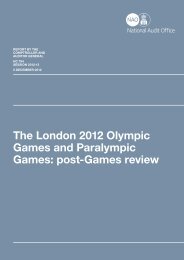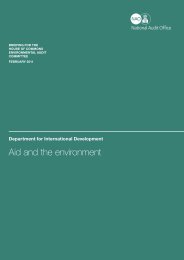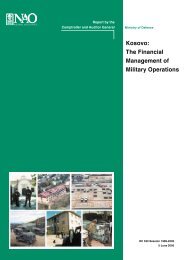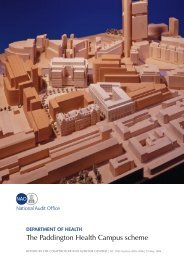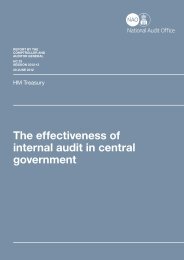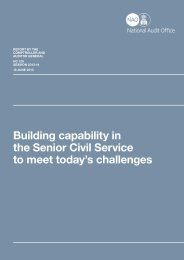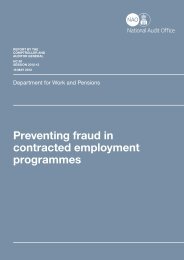Reducing bureaucracy for public sector frontline staff: Briefing for the ...
Reducing bureaucracy for public sector frontline staff: Briefing for the ...
Reducing bureaucracy for public sector frontline staff: Briefing for the ...
Create successful ePaper yourself
Turn your PDF publications into a flip-book with our unique Google optimized e-Paper software.
<strong>Reducing</strong> <strong>bureaucracy</strong> <strong>for</strong> <strong>public</strong> <strong>sector</strong> <strong>frontline</strong> <strong>staff</strong> Part Three 27<br />
External validation and evaluation of <strong>the</strong> programme<br />
3.6 External scrutiny encourages Departments to be robust in <strong>the</strong>ir claims and<br />
provides reassurance to <strong>the</strong> Better Regulation Executive on <strong>the</strong> accuracy of its reported<br />
progress against targets. For <strong>the</strong> Administrative Burdens Reduction programme <strong>for</strong><br />
business Government set up an external validation panel to test claimed savings and any<br />
assumptions and processes underpinning <strong>the</strong> claims 9 . But <strong>for</strong> <strong>the</strong> <strong>public</strong> <strong>sector</strong> strategy<br />
<strong>the</strong>re is no process of external validation <strong>for</strong> Departments claims. The Better Regulation<br />
Executive feels that such a process is not necessary <strong>for</strong> <strong>public</strong> <strong>sector</strong> savings as strong<br />
incentives <strong>for</strong> efficiencies already exist.<br />
3.7 Measuring achievements and assessing outcomes is essential in order to<br />
determine if <strong>the</strong> programme is delivering its intended objectives. <strong>Reducing</strong> data streams<br />
is of limited use if it does not free up <strong>the</strong> time of <strong>frontline</strong> workers to deliver <strong>public</strong><br />
services. Monitoring <strong>the</strong> cost or time savings achieved through reducing unnecessary<br />
<strong>bureaucracy</strong> provides some insight into <strong>the</strong> impact of <strong>the</strong> strategy. But elsewhere<br />
<strong>the</strong>re has been little attempt to assess <strong>the</strong> actual impact of data stream reductions<br />
on <strong>the</strong> efficiency or effectiveness delivery of <strong>public</strong> services by <strong>frontline</strong> <strong>staff</strong>. Some<br />
Departments have limited survey sources which will give some insight such as <strong>the</strong><br />
annual survey of teachers. But <strong>the</strong>re is scope <strong>for</strong> much more attention to whe<strong>the</strong>r<br />
claimed savings are delivering real world benefits.<br />
Next steps in reducing <strong>frontline</strong> <strong>bureaucracy</strong><br />
3.8 The Better Regulation Executive is due to report final progress against its targets<br />
in 2010. Given <strong>the</strong> current economic climate, increasing debt and reducing budgets, it<br />
is likely that a programme to reduce administrative costs and unnecessary <strong>bureaucracy</strong><br />
will remain highly relevant in <strong>the</strong> future. The next steps are still under discussion but it will<br />
be important to co-ordinate any future work within HM Treasury’s wider value <strong>for</strong> money<br />
and efficiency programmes and <strong>the</strong> Cabinet Office’s work on <strong>public</strong> <strong>sector</strong> re<strong>for</strong>m.<br />
9 National Audit Office: The Administrative Burdens Reduction Programme, 2008 (HC 944, 2007-08).



